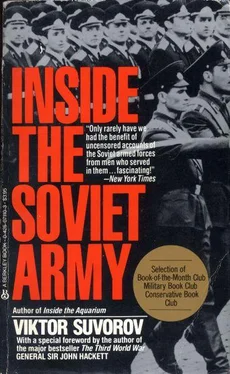Deprived of the right to punish or reward, an officer devises and imposes his own system. Thus, in one company, the soldiers will know that, if anything goes wrong, their night exercises will always be held when it is raining and will drag on for a long time. In another, they will know that they will have to spend a lot of time digging trenches in rocky ground.
Every commander gradually refines his system and he may eventually manage to avoid arrests and officially recognised punishments completely: he comes to be obeyed, without having to resort to them.
6
As well as denying the officer any legal method of controlling his charges, the system also forces him to develop his own methods of instructing them. Nor is he given any proper guidance in ways of ensuring the obedience of the men for whom he is responsible. Those who understand how to exercise power in the USSR guard their knowledge jealously: they certainly do not write textbooks on the subject. This is done for them by professors, who have never set eyes on a soldier in their lives. These professors have no power themselves — they may understand how it is acquired and retained, but their knowledge is entirely theoretical.
Nor will a young officer's colleagues pass on their experience on to him, for it has cost them too much to be handed out free. Anything which he learns at his military training college about relationships with his subordinates is the product of a professor's imagination and is of no practical value.
Once he graduates from his training college, the young officer suddenly finds himself in the position of a lion-tamer in a cage of lions, except that he knows no more about lions than that they belong to the cat family. Thereafter, the system of natural selection comes into operation — if you understand how to control your troops you will be accepted by the system; if not you will be relegated to the humblest of roles.
You learn the techniques of control from your own mistakes — and, unless you are a fool, from the mistakes of others. For there will be mistakes in plenty to be seen everywhere around you.
As an example, for several years the commander of the guard company of the 5th Army Staff punished any form of disobedience without mercy. His company was considered one of the best in the whole, huge Far Eastern Military District. His excellent record was noted and he was nominated for a place at an Academy, which would enable him to develop and to get ahead. With only a month left in command of the company, he found it impossible to retain his tight hold — his thoughts were centring more and more on the Academy. He changed his way of exercising command. One evening he invited all his sergeants to his office and gave them a tremendous party. The night turned out to be an unpleasant one for him — the sergeants, having had a lot to drink, nailed him to his office floor. The unfortunate man obviously had a poor knowledge of history; he had not grasped the simple fact that a revolution does not occur during a period of terror, but at the moment when that terror is suddenly relaxed. Historically, the examples of the French Revolution and of the Hungarian uprising in 1956 illustrate this principle; it will continue to operate.
A tough commander may take a disobedient soldier into the company office and beat him unmercifully. The soldier writhes on the floor for a while but then he gets to his feet, seizes a lamp from the table and hurls it in the officer's face. The soldier will be court-martialled but the officer will never again be able to control his company; the soldiers will laugh at him behind his back.
A young officer in front of his soldiers says to them, `If you get good marks at the inspection I promise you I'll… As an outside observer, you will see scepticism on the faces of the soldiers. You realise that the young Lieutenant is revealing one of his weaknesses, his desire to succeed. You can't always be kind to everyone, Lieutenant, and henceforth anyone whom you treat roughly will use this weakness against you. Everyone has a failing of some sort, but why let others realise it? They may prove to be anything but sympathetic. Just look at this scene and always try to remember the golden rule of controlling others — NEVER PROMISE ANYONE ANYTHING!
If you are able to do something for another person — do it, without having made any promises. From this first rule there follows a second — NEVER THREATEN ANYONE!
You can punish someone and, if you consider it necessary, you should do so. But promises and threats simply weaken your authority as a commander.
After some time you will come to understand the most important rules of all, one which you have never been taught — RESPECT YOUR SOLDIERS.
If a commander is invited by his soldiers to sit at their table, and if he accepts with the gratitude with which he would accept an invitation from his colonel, he is never likely to suffer at their hands. He can be sure that these soldiers will defend him in battle, even if it should cost them their lives. If a commander has learned to respect his soldiers (which means more than just showing them respect), he will suddenly realise, with some surprise, that he no longer needs informers in their ranks. His men will come forward of their own accord, tell him what is going on and ask for his help or protection.
A commander who respects a soldier can ask anything of him and can be confident that the soldier will carry out all his requests without pressure of any sort.
How Much Do You Drink In Your Spare Time?
1
The regimental parade takes place every day at 0800 hours. All the officers of the regiment must attend. Some of them will already have supervised reveille and morning PT, so they will have had to have arrived at the barracks before 0600. If it takes them an hour to get to the unit, they will have had to get up very early indeed. From 0800 to 1500 hours all officers take part in the training programmes. If you are a platoon commander you work with your platoon. If you are a company commander, you may work with your company sergeants or with one of the platoons — perhaps one of the platoon commanders is on leave, or perhaps you have no platoon commanders in your company. Battalion commanders, their deputies and battalion chiefs of staff, either work with platoons which have no commanders or check the training being carried out by platoon or company commanders. Checking training is a good deal easier than being checked yourself.
Officers have lunch between 1500 and 1600 hours. From 1600 until the late evening they are involved in officers' meetings or Party meetings, or they attend Komsomol meetings held in platoons, companies or battalions. During this period, after their lunch, officers also receive their own training — they pore over secret orders, they are shown classified films, and so forth. Meanwhile, the cleaning of weapons and combat equipment is being carried out in sub-units and, although this is supervised by sergeants, the officers are responsible for the condition of the equipment, and they therefore need to take a few minutes to keep an eye on what is going on. Finally, the officer will have to give seven hours of instruction next day and he must prepare for this. The colonel comes over from divisional headquarters to see what preparations we are making. He states that the preparation for a two-hour training period must include a trip out to the training area, the selection of a good spot for the work which is to be done there and briefing for the sergeants on the way the training is to be carried out. Thereafter, sub-unit commanders are to return to the camp and to work with their sergeants, studying manuals, regulations and recommendations. Next, they are to draw up plans listing the exercises which are to be carried out, to have these approved by their immediate superiors and targets, simulators, combat to prepare everything which will be needed — equipment, etc.
Читать дальше












